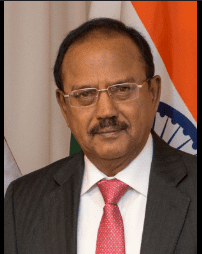New Delhi, May 7, 2025 — As the global spotlight intensifies on South Asia following the high-stakes military strikes under Operation Sindoor, India’s National Security Advisor (NSA) Ajit Doval has stepped up diplomatic outreach. In a series of urgent, high-level conversations, Doval briefed his counterparts from several key nations, including the United States, United Kingdom, France, Russia, and Japan, sharing critical intelligence on the terror attack that prompted India’s military response and underlining India’s commitment to regional stability.
Key Points:
-
NSA Ajit Doval conducts back-to-back calls with global counterparts.
-
India presents evidence of cross-border terror involvement.
-
Operation Sindoor follows the Pahalgam attack, which killed over 40 Indian tourists.
-
Global leaders urge restraint while reaffirming support for counterterrorism.
-
Pakistan remains defiant, warning of “consequences.”
India Ramps Up Strategic Communication Post-Strikes
In the wake of Operation Sindoor — a targeted military campaign conducted by the Indian Armed Forces on terror camps in Pakistan and Pakistan-administered Kashmir — the Indian government has launched a comprehensive diplomatic effort to convey its position to the international community. According to sources in the Ministry of External Affairs, NSA Ajit Doval has become the principal coordinator for India’s international narrative, ensuring allies and strategic partners are informed of the motives, scope, and limited intent of the operation.
Doval reportedly held extended briefings with his U.S. counterpart Jake Sullivan, UK NSA Tim Barrow, French diplomatic officials, and Russian and Japanese security advisors. During these calls, he emphasized that the strikes were “precise, intelligence-driven, and aimed solely at dismantling active terrorist infrastructure” used in the recent Pahalgam terror attack that claimed the lives of 42 Indian tourists and injured dozens more.
Shared Intelligence Presented
 Ajit Doval also shared what he called “irrefutable intelligence” linking the perpetrators of the Pahalgam attack to Lashkar-e-Taiba (LeT) operatives operating across the Line of Control (LoC). A confidential dossier, shared selectively with India’s allies, reportedly includes satellite imagery, intercepted communications, and confessions from captured operatives.
Ajit Doval also shared what he called “irrefutable intelligence” linking the perpetrators of the Pahalgam attack to Lashkar-e-Taiba (LeT) operatives operating across the Line of Control (LoC). A confidential dossier, shared selectively with India’s allies, reportedly includes satellite imagery, intercepted communications, and confessions from captured operatives.
India’s strategic communication has stressed that Operation Sindoor was a defensive and pre-emptive action — not an escalation — designed to prevent further civilian casualties.
Global Reactions: Caution and Concern
While acknowledging India’s right to self-defense, world powers have urged both nations to de-escalate. U.S. Secretary of State Antony Blinken reiterated Washington’s “strong condemnation of terrorism in all forms” while calling for both India and Pakistan to exercise “maximum restraint.”
French President Emmanuel Macron expressed “solidarity with the Indian people” and called for “urgent diplomatic engagement” to avoid a wider military conflict between the nuclear-armed neighbors.
The United Nations Secretary-General António Guterres also issued a statement urging both sides to “prioritize dialogue over confrontation,” warning that any further escalation could destabilize not just South Asia but global security architecture.
Pakistan’s Stance: Denial and Counter-accusations
Meanwhile, Pakistan’s Foreign Office denied any involvement in the Pahalgam attack and called India’s strikes a “blatant act of aggression.” Pakistan’s NSA and military officials have reportedly begun consultations with China and OIC (Organisation of Islamic Cooperation) members.
The Pakistani military has been placed on high alert, with PM Shehbaz Sharif stating that “Pakistan will defend its sovereignty at all costs.” However, Islamabad has not yet launched any retaliatory strike, and diplomatic backchannels reportedly remain open through UAE and Qatar.
What’s Next?
NSA Doval is expected to meet with ambassadors of major UN Security Council nations in New Delhi later today. Sources indicate that India may soon release a public version of its intelligence dossier to increase transparency and gain broader international support.
Meanwhile, Indian security agencies remain on high alert across border states, and the Ministry of Civil Aviation has imposed temporary airspace restrictions in the northern region.
Here is the official press release from the Press Information Bureau (PIB) of the Government of India regarding Operation Sindoor:
🔗 OPERATION SINDOOR: INDIAN ARMED FORCES CARRIED OUT PRECISION STRIKE AT TERRORIST CAMPS

